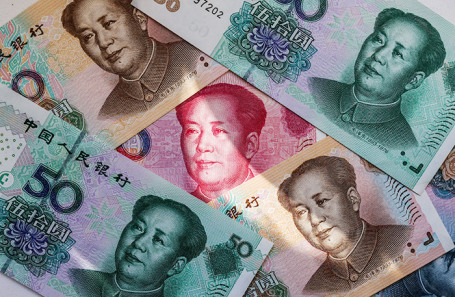The Ministry of Finance will increase sales of yuan by almost three times
Due to the lower export duty on gas, the Ministry of Finance expects a shortfall in oil and gas revenues of the federal budget in the amount of 108 billion rubles only in February. How critical is this amount for the budget?
Photo: Alexander Demyanchuk/TASS
Updated at 15:40
The Ministry of Finance sales of yuan by 2.8 times as part of the fiscal rule from February 7 to March 6. It will sell foreign currency for 8.9 billion rubles a day (compared to 3.2 billion rubles in January).
Due to lower-than-expected receipts of the export duty on gas, the Ministry of Finance will receive less oil and gas revenues from the federal budget in February in the amount of 108 billion rubles. This is twice as much as in January. Alexander Isakov, an economist at Bloomberg Economics for Russia and Central and Eastern Europe, commented on the situation :
— How can you estimate the figure of losses due to lost oil and gas revenues in the amount of 108 billion rubles in February? More than 50 billion rubles in January - is it a lot or a little?
- This is approximately how it should have been for two reasons: our basic oil and gas revenues, from which we deviate downward, were made up last summer, and then there was no explosion at Nord Stream, because of this volume of natural gas exports and prices a little overpriced. In addition, the spread between Urals and Brent widened in January, which increased normal sales from 50 billion rubles to about 100 billion rubles. I think that by the end of the year the Ministry of Finance will sell about 100-120 billion rubles a month steadily, and by the end of the year we will sell about $20 billion, which will reduce the liquid assets of the NWF from about $87 billion to $67 billion.
Is it painful for the budget, for the treasury?
- I think that this is the purpose for which these accumulations were once made. They were created exactly in order to use them now.
- The ruble should react positively and rise to the news that much more currency will be sold. But for some reason it didn't happen. Why do you think?
— The fact that sales are growing, due to some widespread opinion among analysts, is considered positive for the ruble, but physically this is absolutely not true. The growth in sales is due to the fact that less foreign currency comes to Russia, only a part of this additional inflow is withdrawn through taxes. Therefore, there will be more positive news for the ruble when sales not only decrease, but also the Ministry of Finance starts buying foreign currency.
- When, you can at least guess?
- In order for the Ministry of Finance to start buying foreign currency, we must see Urals at a price above $65 per barrel. For this, I think Brent should be above $90 per barrel.
recently published a forecast that Russia, at current prices, could almost lose its entire supply of yuan. Is this scenario true? Opinion of the chief economist of PF "Capital" Evgeny Nadorshin :
— It depends on how the budget deficit will be financed, and the Minister of Finance is already preparing the market at the beginning of the year, because the deficits will be higher than those budgeted. In my understanding, this year's budget is completely untenable. Already, I think, now the execution is not going according to that plan. Depending on how this deficit will be financed, I still expect 5 trillion rubles in the baseline scenario, which is quite tolerable. This can “eat up” all the yuan, there are a little more than 3 trillion of them, taking into account the interventions. They will not be enough to close the deficit, so borrowings will be needed, borrowings so far, unlike at the end of last year, are not going very intensively. Together, perhaps, these two sources will cover the deficits of this year.
Will rising oil prices save the situation?
- It will save, of course, if - this is an important reservation - it will affect the Russian variety. It must be understood that not in all circumstances of this increase it may turn out that it will spread to Russian grades and Russian oil products, which is important. Because until the current date, as far as I know, oil products go almost without a discount.
- Today is only February 3, while the Ministry of Finance has already calculated that it will receive less than 108 billion rubles. Can the figure seriously change by the end of the month?
- It is difficult to work only on forecasts. For example, it was clear to me that the 8 trillion rubles planned as oil and gas revenues for this year might not be received. How much may be underreceived, while the question is open, depends on many factors, including the course and effectiveness of the sanctions, some of which will come into effect on February 5, including how the costs will be executed. All of this together can make a big difference. I have a feeling that 8 trillion rubles will not be received or somewhere on the edge. To a large extent, this will be helped by the depreciation of the ruble, and not at all by the situation, there are breakdowns in terms of supplies, in terms of volumes, but it is impossible to say that this year will be comfortable in terms of income, especially looking at January. In my opinion, I have never seen such a bad January in terms of revenue.
The volume of transactions depends on the amount of oil and gas revenues of the federal budget. In the event that projected oil and gas revenues exceed the base monthly level, the Ministry of Finance will carry out operations to purchase liquid assets in the amount of additional oil and gas revenues. In case of forecasting in the current month of lost oil and gas revenues of the federal budget, operations will be carried out to sell the corresponding volume of liquid assets.

